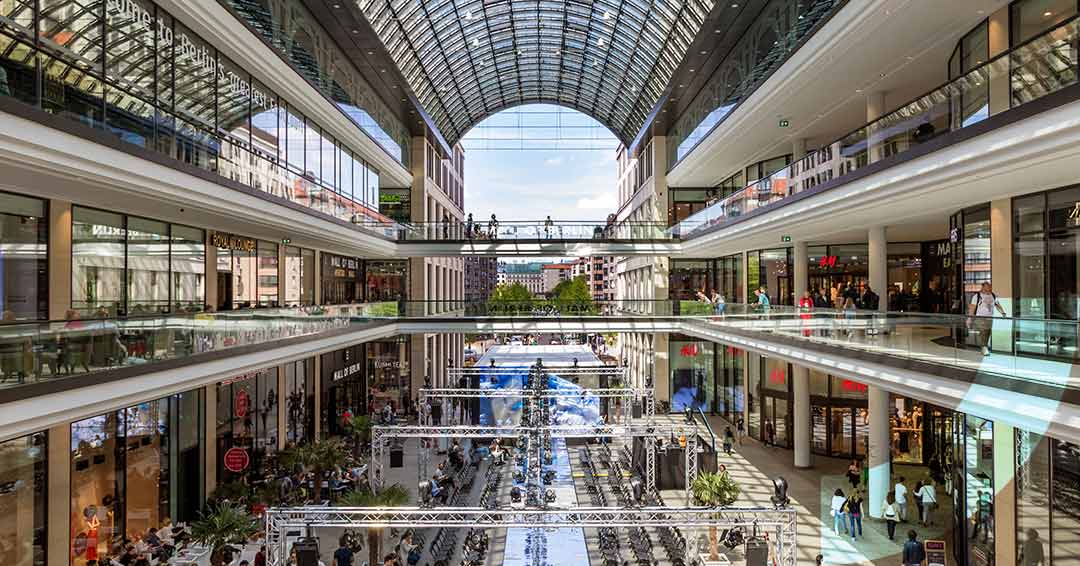
The New Hybrid Customer Experience
By Florian Hübner, CEO & Co-Founder, Uberall
As we emerge from a global pandemic I am optimistic about what the future holds for brick-and-mortar businesses. While to some this may seem slightly naive, I am reminded of why I started Uberall eight years ago – to empower businesses to thrive locally. Today this mission seems more important than ever.
This picture below represents one of many disruptions for location-based businesses, the rise of the superstore and shopping mall. I remember when malls first started opening up, the whole family could go, there was something for everybody, from the stores we all liked to various lunch options at the food court – a new concept for me then. Berlin now has more than 70 malls, this is one of them, the Mall of Berlin at Leipziger Platz.

This then-new concept of malls was and is a big challenge for small local businesses and the high street. The reality is brick-and-mortar businesses have always been challenged by new concepts from drive-thru dining to massive mail-order catalogues.
With every new concept analysts and economists often predicted the fall of brick-and-mortar businesses, but consumers said “Not so quick. We will tell you how we want experiences to work for us.” This continued with the dawn of the internet and each new wave of innovation that followed – eCommerce, mobile, social, chat, personalization, AI, IoT. Throughout all of this change, it has always been businesses obsessed with a customer experience that reignited growth and landed on top.
This is because humans appreciate a good experience over almost anything else. In fact, 54% of consumers will pay more for a great customer experience according to a global survey, the Hybrid CX Advantage.
Today’s Consumers Want Hybrid Experiences
Today everything is hybrid! We work in a hybrid mode and we consume in a hybrid mode.
To some extent, hybrid everything is a circumstance of the pandemic – behavior born out of necessity. But it’s hard to dispute that the pandemic has left some lasting preferences. In fact, most customers actually prefer a hybrid experience over one that is entirely online or in person, according to a global survey, The New Face of Local.
Let’s take the example of working remotely. For a global software company like Uberall it is certainly more efficient to conduct the majority of our meetings via video calls vs traveling across the world. But at times it is also important to meet in person to create memorable experiences and build deeper relationships. The mode – in-person or remote – is driven by the goals.
The same holds for how we choose where to eat, shop and play. Subsequently, businesses should think about creating the right experience for the customer.
Local Advantage in a Hybrid World
It is crucial that we repeat over and over again that this is not about online vs. offline.
We tend to think in black and white – “big assortment vs small inventory”, “convenient vs. inconvenient”, “social vs. boring”, “personal vs. standardized.” None of these are tied to being online or offline and no business necessarily has the ultimate advantage because of one or the other. And therein lies the opportunity. It’s not about one channel or another, it's about understanding what your customers value and the unique experience advantages your brick-and-mortar businesses offer.
Consumers do not choose a specific channel for the sake of it. They chose it for the experience it offers. We tend to forget that e-commerce businesses sometimes take pretty bold measures to compete with the experience of brick and mortar businesses. To give you an example, this is exactly why Zappos and Zalando allow you to order 5 pairs of shoes and send 4 or even all 5 back if you choose to do so. They do this to compete with the experience of a local shoe store, where it’s not a problem at all if the shoe you picked doesn’t fit. You don’t have to buy it but just try the next one instead.
And location-based businesses are in turn innovating by leveraging technology to provide transparency into the local experience – from local inventory to unique offerings and amenities. Both online and offline businesses themselves are becoming hybrid and each has a slight advantage depending on what experience best meets the customer's goals.
Specifically, location-based businesses have local advantages like:
- ‘Need it now’ convenience
- The promise of real-time human expert consultation
- Unique real-world experiences like smelling tea at a specialty shop or participating in an Oktoberfest celebration at a local brewery.
What’s Next - Connected Customer Experiences
As we look to the future and where we will invest our product and engineering resources at Uberall, we always come back to our mission – to empower businesses to thrive locally. To do this we must help brick-and-mortar businesses compete on experience.
However, competing on experience is a moving target, with customer expectations always on the rise. Today’s innovation is tomorrow’s status quo. We see it time and again with things like local search, online appointment booking, delivery apps - all at one point very innovative, now an expectation.
In order to help Uberall clients keep up with rapidly evolving consumer expectations, we are moving to an integrated platform approach. Our new hybrid customer experience platform - Uberall CoreX - powers the entire customer journey from online discovery, to store visits, to recommendation and repeat purchases.
We are hard at work to expand our capabilities in this new direction. Stay tuned for more news on this next chapter of enabling local businesses to be winners in this new hybrid world.
About Florian Hübner:
Florian Hübner is CEO and co-founder of Uberall. Before founding Uberall in 2013, Hübner spent several years as a strategy consultant for McKinsey & Company, where he advised leading companies across a variety of industries. After McKinsey, he worked as a researcher at the Hasso Plattner Institute in Potsdam.
Want to level up your hybrid customer experience?

